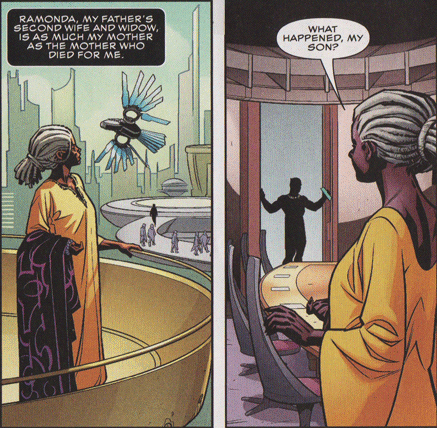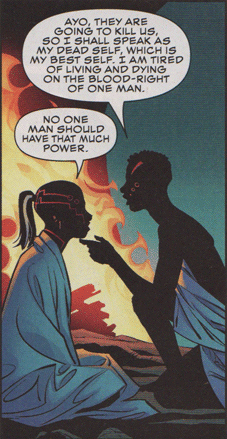

| July 2017 |
|
| Ta-Nehisi Coates & Brian Stelfreeze: Black Panther | |
 One of few positive events of 2016 was the announcement of Ta-Nehisi Coates taking over Black Panther. I've now read his first story arc (a year of stories). It's a remarkable work. I don't think it does everything it sets out to do, but balance that against his extraordinary ambition, and the fact that I don't like superhero comics much.
One of few positive events of 2016 was the announcement of Ta-Nehisi Coates taking over Black Panther. I've now read his first story arc (a year of stories). It's a remarkable work. I don't think it does everything it sets out to do, but balance that against his extraordinary ambition, and the fact that I don't like superhero comics much.
First, the ambition. Coates takes seriously two notions rather casually tossed off in the fifty years of the character's existence: a) that the tiny African nation of Wakanda has the most advanced technology on the planet; and b) that Black Panther (T'challa) is its absolute ruler. Coates asks: why does this advanced country tolerate the most regressive possible political structure? Add to this that (in Marvel continuity) Wakanda had recently suffered an enormous flood engineered by Namor, a coup led by Dr. Doom, and an invasion by the villain Thanos.
His answer is, it doesn't. Two revolutions break out: one led by the hotheaded Tetu who thinks that suicide bombing is a useful tactic, one by a lesbian couple (Ayo and Aneka) from T'challa's own all-female bodyguard, who are more into revenge against evil men. And both have valid grievances: the king insists on his absolute right to rule, and yet half the time he's off gallivanting with the Avengers or something. Does he want to be a king or a hero?
Now, superhero comics make nods to real-world problems, like crime and corruption, but they’re stupefied by the convention that every issue must include a big battle, and they inevitably get lost in the tangled intrigues of unbelievable supercreatures. Coates only partly escapes all this. He's come up with a predicament which is essentially political: it can't be solved by T'challa beating up a few thugs, though we have to have those fights anyway. It mostly requires him talking things out with people, and it takes a long time to get to that point. Until then he seems more like Hamlet than Hercules.
The trade paperback volumes include reprints of earlier stories, which mostly show how silly the rest of the genre is. The besetting sin of superhero comics is grandiosity. Going back to the earliest examples, the villains are always leeringly proud, the heroes defiant, and everyone has about a 100:1 words-to-punches ratio.
Killmonger: My diversion did not keep you occupied as I'd hoped! But if you desire my presence then look well— for it'll be your last kingly act! Killmonger is— here!And more recent stuff is little different:
Kristoff: You have a plan, don't you, father?
Doom [standing in his own lab, with no enemies present]: Of course. But I have more than a plan. I have the pieces necessary to bring it to pass. …Thanks to the Molecule Man! Let there be suffering and woe to all who stand in my way.
This is apparently how the writers think powerful people talk. And it's true that some people do talk that way! It's the natural mode of dictators (fascist and communist) and would-be dictators like Trump. But as a literary device, there's a thin line between hubris and ridiculousness, and for me at least, comics bounds over that line like a bumbling puppy.
Besides the pure silliness, this sort of bombast also reeks of insecurity. The boaster is afraid that without his boast he will not be threatening. The truly powerful person does not need to bluster; he can be mellow instead. He does not need to talk to impress, and he always has another trick up his sleeve.
Coates averts the problem. He's said that the best preparation for writing comics is writing poetry, and his version of Panther makes a good case for that. At his best, as in the panel at right, he finds just the right note, elevated and just a little strange.
 (And if you've been living in a cave somewhere, the second line is a bow to Kanye West.)
(And if you've been living in a cave somewhere, the second line is a bow to Kanye West.)
The downside is that there's almost no humor in the book. Now, since the scourge of grimdark hit, this has been true of most of the Big Two. But dialing the intensity up to 10 all the time ends up lessening, not enhancing, the seriousness of the narrative. (Some of the best bits of the 1970s X-Men were the many pages where they were just messing around the mansion.)
Book Two has two maps of Wakanda— one from Coates, one from Black Panther's first major solo story, from 1973. They're an interesting contrast. The 1973 map puts Wakanda on the Atlantic, but also shows it as about the size of a video game level. And it's far from being the most technologically advanced country on the planet— even the capital is a mass of grass huts.
Coates's Wakanda is much bigger, with several major and very futuristic cities. He places it next to Lake Nyanza or Lake Victoria, which means it's about in the location of Uganda and Rwanda. Unlike the earlier map, Coates's map indicates its neighbors: Mohannda, Canaan, Azania, and Niganda. As a map nerd, I like having some geography to pin the story to, but I'm a little disappointed that the whole region is pure fantasy. (It doesn't help, of course, that the principal threats to Wakanda are equally fantastic: Doom's Latveria, Namor's Atlantis.) It means that the story isn't set in Africa but in “Africa”; there is a lot more interest in the absurdly detailed lore of the Marvel Multiverse than in actual Africa.
In most of the issues, the artist is Brian Stelfreeze, who does amazing work. His Afrofuturist Wakanda is beautiful and helps sell its advanced technology; his Panther is darker and more menacing than ever. His character designs restore some of the real Africa that the plot lacks. An Overwatch player will have a hard time not thinking of Numbani.
It's not surprising that Coates and Stelfreeze effortlessly make a black-centered story; what's even more heartening is its hearty inclusion of women. The story is full of strong women: Ayo and Aneka, the villain telepath Zenzi, the king's mother Ramonda and his sister Shuri, his ex Storm, his Harlem friend Misty.
You may wonder, how accessible is this story to someone who has never read Black Panther? Pretty well, I think. I haven't read any and I understood it just fine. If you've never read any superhero comics at all… how did you manage that, and why? But anyway, a good double comparison might be
Raymond Chandler : mysteries :: Ta-Nehisi Coates :: superhero comicsThat is, he's making the genre deeper, more literary, a little more connected to actual politics and problems of power. The heroes will struggle a bit more, the villains will be more believable. But it's still genre. There will be outré costumes and fisticuffs and people with weird powers. And a few characters that seem to come out of nowhere and yet seem to be important. But that's why you should read the three trade paperbacks all at once, not single issues.
If you like the book, there's also a new TPB of World of Wakanda, Roxane Gay's telling of how Ayo and Aneka met, and how they ended up as vigilantes. It's a promising idea, and it's a crime that Marvel canceled the book before the TPB even arrived. But it doesn't add that much to Black Panther #1: the plot points we know about keep thudding in like wet sandbags. Plus, I dunno, Coates creates sympathy for the pair while being quite aware they're cops who killed a man without trial; Gay doesn't seem to think about it.
